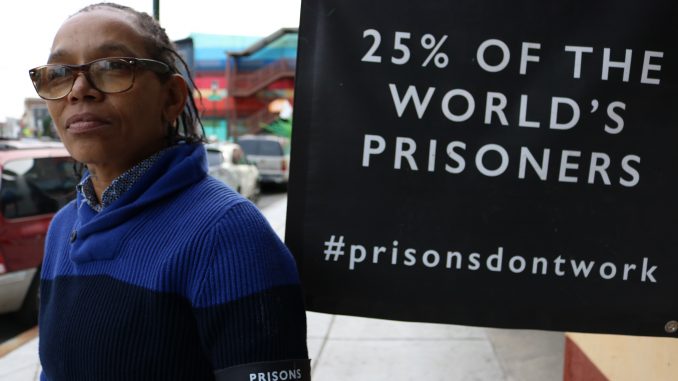
When Faith Bartley finally returned home at 45, her mother gave her the sofa, a SEPTA pass to look for work and a pack of cigarettes.
“You’ve got to get it together,” her mother said.
“Mom,” Bartley said. “I’m going to get it together.”
Bartley was addicted to crack cocaine. She hadn’t been home since she left at age 19 to join the military.
“I stayed away from my mom because I thought I was a disappointment to her,” she said. “Finally, one day, I was walking along the Boulevard and Adams. I had my crack pipe in my hand and I just took it and stepped on it. My brother somehow pulled up on me, divine intervention, and he was like, ‘Faith, what’s wrong with you? You know Mommy is dying? She ain’t going to be here long. What’s wrong with you?’”
Bartley made it home in June 2009. Her mother passed away from liver cancer just three months later at Temple University Hospital.
“She died in my arms at Temple,” Bartley said. “She looked in my eyes and was like, ‘Faith, just get it together.’ I was like, ‘Mom, I got it, I’m going to do right.’”
The story is still painful for Bartley to tell. Her voice cracks. Her hands shake. But she still tells it; in fact, it’s hard to estimate how many times she’s told her story to the women of the North Philadelphia community who attend the People’s Paper Co-Op event, Ladies Night.
Part of the Village of Arts and Humanities, the co-op is an initiative designed to help community members with re-entry after incarceration by providing support and expungement programs. Ladies Night focuses on women in re-entry, giving them a monthly forum to meet and talk with similar women and create art related to their journey.
Bartley—also in re-entry—was approached by El Sawyer, the operations director at the Village, about joining the co-op after she quit her job as a waitress, but she thought she’d just be selling books outside Temple. Then one day, when she was standing outside, waiting for her clothes to dry, Sawyer told her there was much more to the job.
“So I said, ‘OK, let me put my clothes in the dryer and I’ll run to the Village and see what it entails,’” Bartley said. “I’ve been here ever since.”
Now a fellow at the People’s Paper, Bartley held the first Ladies Night in early fall of 2015. The co-op partnered with InLiquid artist Cathleen Cohen to create an art exhibit surrounding the event, which opened Jan. 14.
As part of the special collaboration, Cohen, a watercolor artist and the education director at ArtWell, created portraits of the women. Cohen was attracted to the Ladies Night project because it allowed her to experiment with the crosspoints of art and social activism.
“You know, there’s always an element of expressing yourself, but that’s not always communication with other people,” Cohen said. “More and more, I’m very interested in the social aspect of it. Not just a communication, but art as a tool to something else as well. I’m more interested in social change or growth and communication, what we can do as a community.”
Cohen started attending Ladies Night in August of 2015, spending time with the women and taking photos of them, which she used to complete the portraits.
“You kind of get to know people through doing their portraits,” Cohen said. “You think you do. You feel close with them, you get to appreciate them. You see so much in how they hold their head, or a look in their eye.”
Cohen’s portraits hung in a long hallway at Crane Arts, unadorned by frames, embraced only by thick, white matting. The images were intimate—women laughing, some looking away, some meeting the viewer dead-on.
The medium of watercolor, Cohen said, only affords the artist so much control—working with watercolor allows for discovery. Trying to capture strangers in portraiture was difficult, she said, but the experience allowed her to walk away with more confidence in her own work and a knowledge of the community.
“I learned about their desire to really work together and bond together and keep moving forward,” Cohen said.
When the women visited the exhibit, Bartley said, they were ecstatic to see their portraits on the wall. Cohen had already offered to let the women keep their portrait, but one attendee of Ladies Night wanted more copies of the portrait to hang in her home.
“Everybody wanted to take their portraits home the first night of the exhibit,” Bartley said. “They were standing there like, ‘Look, look at me! I look like Oprah from The Color Purple!’”
“A lot of them hadn’t been to an art show before,” Cohen said. “I could see their excitement. As an artist, that meant a lot to me, because they were looking at it and talking about themselves being proud.”
Though the exhibit at InLiquid will close March 4, Ladies Night will continue. Bartley’s already seen a change in herself—not to mention the difference in the women attending.
“They learn how to get along with each other, how to galvanize and come together as women in our community,” Bartley said. “They borrow from each other mentally. They absorb. It’s powerful.”
Victoria Mier can be reached at victoria.mier@temple.edu


Be the first to comment